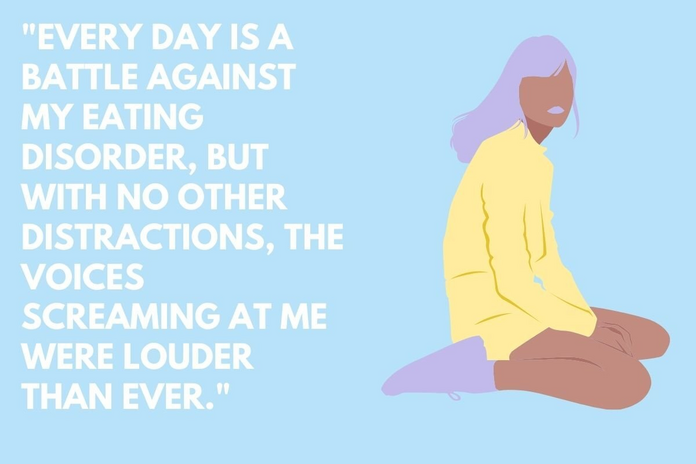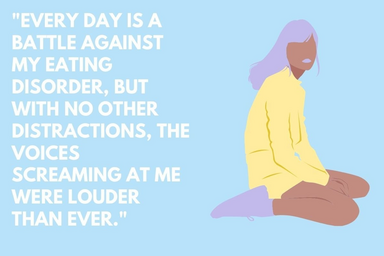Despite taking all the precautions necessary to stay safe from COVID-19, I was placed on a 14-day quarantine in mid-September due to exposure. For any individual, this news can be devastating. It had only been a few weeks since I moved into my dorm, and I was just starting to make friends. I was going out in small groups, and I finally felt like I had adjusted. A 14-day quarantine was almost half the time I’d been attending classes. Two full weeks of social isolation could drive anyone crazy, but for me, I found the struggle to be much worse than I expected.
College can be a stressful time for everyone, and it isn’t uncommon for old habits to resurface. During my first month of college life, I had been vigilant about not slipping back into self-destructive tendencies. As someone who has been recovering from a severe eating disorder for over four years, I know that I must hold myself accountable. When I get overwhelmed, it’s easy to turn to old behaviors for comfort, but when that happens, I keep myself distracted with friends and outside activities. I knew that quarantine would be hard considering I wouldn’t be allowed to leave my dorm room for 14 days, but I thought I could manage my time pretty well and get ahead on school work.
I had just gotten back to my dorm after seeing a few friends when I got the email. I had been exposed to someone who tested positive for COVID-19. My stomach dropped. There had to be a mistake. I spent the morning pacing around my dorm, wondering what I was going to tell my roommate. I panicked. I cried. I felt awful. I was frustrated and guilty, like I had done something wrong. I had tried to be careful. I had limited going out, I washed my hands, and I kept my circle of friends I met with fairly small. I laid in bed and let my thoughts settle for a while. I didn’t want anyone to be mad at me. Then, I finally called my roommate. She packed a bag to stay somewhere else and left me some painting material to keep me busy. It was going to be a lonely two weeks.
On my first morning, my breakfast was delivered. I usually make myself a bowl of oatmeal or have some fruit in the morning, but the delivery was sausage, hash browns and french toast. I thought my food anxiety had been better recently, but I quickly realized I’d been fooling myself. I had just been staying extra busy to avoid those feelings. I stared intensely at the greasy hash browns and sausage I knew I wouldn’t be able to eat. A few bites of the french toast was enough for me; I was emotional and didn’t have much of an appetite anyways.
My dinner arrived around 5:30 p.m. I was given steamed veggies, a mini portion of potatoes, and to my dismay, a giant portion of roast beef. I’m mostly vegetarian, partially due to ethical beliefs, but if I’m being honest, I’ve been afraid to eat meat ever since I developed my eating disorder. I opened my bag of breakfast snacks supplied for the next morning. There was an apple, a banana, some raisins, a muffin and a bottle of juice. I didn’t have a chance to notify the dining services about my meal preferences because I had read the email too late in the day. With such limited options in front of me, I tried my best to eat some of the steamed veggies. Since I was quarantined, it was nearly impossible to ask anyone to bring me something else. Later that night, I ate ice cream left in my freezer as a second dinner, since I didn’t have much else left in my dorm.
To stay busy, I paced around alot. I was so anxious and overwhelmed that I had to move. As part of my eating disorder struggles, I need to walk around a lot throughout the day, or else I get bombarded with negative thoughts. I’ve made progress with my “rules” since beginning recovery, but I noticed the longer I sat in my empty dorm room, the harder it was for me to just relax and stay calm. By not moving outside of my room, I felt lazy and upset. I tried to do jumping jacks, dance routines, ab circuits, anything to release some steam. Every day is a battle against my eating disorder, but with no other distractions, the voices screaming at me were louder than ever. Every moment was an argument in my head. I pulled out every skill, distraction, and technique I was given during my time in recovery treatment, but this was one of the worst episodes I had dealt with in months, and I wasn’t prepared.
I worked on some assignments and spent the rest of my first night painting, organizing and cleaning. It was hard to concentrate with all the thoughts racing through my mind, and I eventually just gave up and went to sleep. This was only the first day.
The thing with eating disorders is that when you aren’t at your lowest, no one around you knows that you’re struggling. Every day since I’ve been on campus, I’ve forced myself to eat three meals a day with at least one snack. With the limitations I was put under due to my quarantine, I had to challenge myself to eat what was given to me and accept that at this time, nothing I did would change my circumstances. I spent most of my days trying to reassure myself that I wouldn’t magically gain 100 pounds in two weeks. Each moment was overwhelming. I was functioning, but my thoughts were constantly reeling with anxiety and negativity.
While being quarantined, I had gotten sick with strep throat, and I was convinced I had COVID. It was scary being alone in the dorm feeling as weak and sick as I did. I didn’t know who to call first. I felt guilty for ever going out, and I thought that if I did have COVID, it was clearly all my fault, despite my efforts to constantly clean my dorm with Lysol and distance myself from larger groups. I made calls to the Student Wellness Center and WVU Medicine, and I eventually got an appointment to see the doctor later that morning. The nurse came out in a hazmat suit and took me inside to run some tests. Thankfully, instead of having COVID, I tested positive for strep throat. I was shaky and dizzy, and I had to walk myself to and from the Wellness Center to avoid contact with anyone else since I was still technically quarantined. I got my medicine and headed back to my dorm room, where I laid in bed for pretty much the rest of the day.
Not being able to choose my meal options was one of the hardest parts about being quarantined. Because I was sick, the food I had delivered was even more unappealing. A lot of it was spicy or too nauseating to try. I didn’t want to let this setback cause a relapse, but my struggle to eat while having limited food options was extremely difficult. It’s easy to ignore the thoughts in your head when you’re running from class to class, or when your friends invite you out to get lunch. My eating disorder is quieter then, but when you’re alone, it’s harder to ignore the voice telling you not to eat.
After a week of being quarantined, I had reached a breaking point. I was still recovering from strep, and I couldn’t stand the thought of sitting alone in my dorm all weekend while also struggling to eat the questionable dining service-provided meals. I spent a few days back home to clear my head and get back on track. I was kept company by my family, and slowly my anxiety wore off. I had some homemade meals and some much needed support from my family.
No one really thinks about it, but quarantine isn’t just an inconvenience and annoying situation to deal with; it can be extremely triggering and dangerous for those who suffer with mental illness. I’m getting back on track now, after coming out of quarantine, but it was a big wake up call that mental health problems can be triggered unexpectedly, and it has made me more aware of the struggles of those around me.



